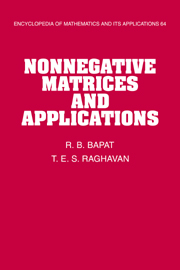Book contents
1 - Perron-Frobenius theory and matrix games
Published online by Cambridge University Press: 17 September 2009
Summary
The Perron-Frobenius Theorem is central to the theory of nonnegative matrices. An irreducible nonnegative matrix can be viewed as the payoff matrix of a zero-sum, two-person game with positive value. A matrix game is said to be completely mixed if no row or column is dispensable for optimal play. In this chapter we first exploit the properties of completely mixed matrix games to prove the Perron-Frobenius Theorem. The next few sections deal with certain related topics such as M-matrices, the structure of reducible nonnegative matrices, primitive matrices, and polyhedral sets with a least element. We then describe the basic aspects of finite Markov chains. In the final section we prove the Perron-Frobenius Theorem for operators that leave the Lorentz cone invariant.
Irreducible nonnegative matrices
We work with real matrices throughout, unless stated otherwise. Let A = (aij) be an m × n matrix. We say that the matrix A is nonnegative and write A ≥ 0, if aij ≥ 0 for all i, j. If aij > 0 for all i, j, then the matrix A is called positive and we write A > 0. For matrices A, B, we say A ≥ B if A — B ≥ 0. Similar definitions and notation apply for vectors.
- Type
- Chapter
- Information
- Nonnegative Matrices and Applications , pp. 1 - 58Publisher: Cambridge University PressPrint publication year: 1997
- 1
- Cited by

